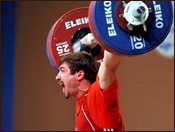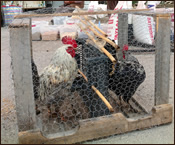Cruel Sports
 Not far from here, the European weightlifting championships are taking place. This is apparently very important to the Turks: the triumphs of their countrymen Sibel Şimşek and Fatih Baydar are matters of national pride, lauded in newspapers and on television. I watched some of the competition on Eurosport in my hotel room (much to my other half’s chagrin): the camera panned to the crowd whenever a Turkish competitor took to the stage. Flags waved, the crowd roared: I think I saw Mr. Baydar’s mother cheering and praising her son from the stands.
Not far from here, the European weightlifting championships are taking place. This is apparently very important to the Turks: the triumphs of their countrymen Sibel Şimşek and Fatih Baydar are matters of national pride, lauded in newspapers and on television. I watched some of the competition on Eurosport in my hotel room (much to my other half’s chagrin): the camera panned to the crowd whenever a Turkish competitor took to the stage. Flags waved, the crowd roared: I think I saw Mr. Baydar’s mother cheering and praising her son from the stands.
Weightlifting is like many other highly competitive sports: there is an element of cruelty in it. Earlier today, I saw other parts of the contest: a young woman from Slovakia took up her stance before the bar and as she began to strain, a vein started to bulge and throb on the right side of her head. It looked alarming, as if a blood vessel was about to burst. Fortunately the ordeal did not last long. Eurosport had the courtesy to show her coach’s reaction: he urged her on, and looked crestfallen when her arms sensibly decided to drop a weight that was far too heavy. This was by no means the most alarming spectacle: a Turkish woman, perhaps inspired by the crowd’s enthusiasm to take risks which were obviously too much for her, missed being struck by the bar by only a matter of millimetres. After her, German woman wobbled as she hoisted the weights, collapsed and nearly escaped injury. The competition looks simultaneously insane and impressive to an outsider: the athletes have striven for years to reach the peak of physical condition, and are risking a great deal the moment they leap onto the stage. A sensible person would step out of the way, the brave push it to a point, and the obsessed teeter on a precarious pivot, tempting disaster to strike. However, ultimately it is the choice of the athletes to do this; they pick the cruelties to which they subject themselves, whether it lay in physical pain or the zealotry of an aggressive coach. Those who earn gold medals here in Antalya are no doubt deserving of their prizes.
In contrast, the news about the Grand National race reached me via Twitter: two horses dead, and I’ve read rumours about three others being injured. Apparently it was the closest final for some years and thus was a thrilling spectacle. Certainly the jockeys deserve both credit and sympathy for the race they’ve had to run, but what about the horses?
It’s impossible to know the precise emotional state of a horse in such a situation: however, one can make some educated guesses. The horses are lined up in such a way that they are quite close to one another; the scenario is quite unnatural. There is a human on each horse’s back. The human brandishes a riding crop. The race begins, the crop flies and strikes the animal repatedly: it is possible that a sense of panic ensues as well as pain. The crush of horses together perhaps heightens the tension. The sound of galloping hooves is deafening, the mud flies, the push onward from the human becomes more insistent. The heart races, the lungs can’t take in enough air, the legs hurt and strain. Obstacles are in the way, leaps are made despite whatever risks may be. Sometimes the calculations are wrong, there is the hard landing, the cracking of bone, the rush of blood and agony, and eventually eternal sleep. Other times there is the breaking free of the pack, the finish line, the long slow trot back to the stable and quiet at last. The horse doesn’t know why it is subjected to such trauma: it never had a choice in the cruelty to which it submits. It can only be terrified, run, and survive. If it’s very lucky, one day its sole duty will be to sire other horses.
Why do we like this? Why do we tolerate it? What is wrong with human beings that we cannot accept the kind of personal risk we see in weightlifting as sufficient sport, rather we need to subject animals like horses and fox to our need for entertainment?
It is straightforward to ascribe some of the blame to the legacy of the class system: after all, indulging in sports such as pheasant shooting, fox hunting and horse racing tend to be the purview of the landed aristocracy. Certainly, betting on the horses has extended into other social castes, but nevertheless, the aforementioned sports and in particular events like the Grand National and Royal Ascot are primarily associated with the old upper class. Could it be that since the old aristocracy no longer feels itself the master of the land or its people, that their appetite for dominating something still needs to be whetted? Could it be that the class system has had the after effect of creating a “utilitarian” view of both people and human beings: that their worth lay in their utility to the user? Is it some ritual that is preserved merely for asserting privilege which no longer exists?
 That said, it’s probably not fair to blame solely the aristocracy; certainly they are no help. However, yesterday afternoon in a Turkish market, I saw two cockerels locked in a wire cage. I presume that this was not for the purpose of serving them for dinner later. Dog racing is not a particularly posh activity, nor is badger baiting. It may be that there is a terribly ugly streak in human nature which suggests that we treat the gifts of the earth as our property rather than something that is on loan while we reside here.
That said, it’s probably not fair to blame solely the aristocracy; certainly they are no help. However, yesterday afternoon in a Turkish market, I saw two cockerels locked in a wire cage. I presume that this was not for the purpose of serving them for dinner later. Dog racing is not a particularly posh activity, nor is badger baiting. It may be that there is a terribly ugly streak in human nature which suggests that we treat the gifts of the earth as our property rather than something that is on loan while we reside here.
To be fair, there are sports in which human and animal work together in partnership: I refer to polo. Thanks to Michael Palin’s documentary series about the Himalayas, it was possible to witness a relationship between horse and rider which suggested that something other than raw terror was going on. The purpose of the Himalayan polo match was to stretch both horse and rider, but neither was taken to breaking point. Respect was key: the rider cared about his horse’s emotions as well as his health; it is difficult to see how that could be the case in a scenario in which the metaphorical gas pedal is always pushed to the floor.
The arguments for preserving fox hunting were overcome, eventually. Its elimination from the British countryside is not just a matter of law, but also a change of heart: some did so enthusiastically, more are shifting with reluctance. No doubt there would be howls of protest if Ladies’ Day at Royal Ascot ended: hat designers will be up in arms, celebrities will be mortified, gossip columnists will write seething calumnies. But think of the horses, think of their terror, think of responsibility humans have, as the only animal capable of the stewardship (as well as the destruction) of the earth, to be wise and kindly caretakers of the land. Yes, the Racing Post may go out of business and Sir Clement Freud may spin a few turns in his grave: but better that than to preserve cruelty, even if it bears the name of sport.


